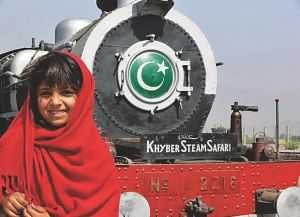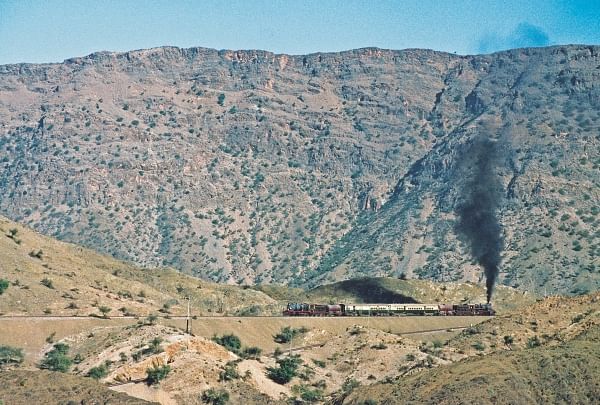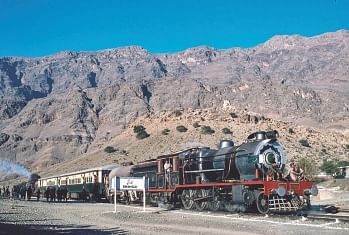| Home - Back Issues - The Team - Contact Us |
 |
| Volume 12 |Issue 02| January 11, 2013 | |
|
|
In Retrospect The Khyber Pass, the Hindukush Mountains, and the Steam Engine Nasim Firdaus
My search for the steam rail brought in mixed reactions from friends and acquaintances. Some said it did not run any more, some said it was too dangerous to travel by. They said the Government of Pakistan had no control over the area; instead a dozen or so tribes had absolute control over the Khyber Pass; tribal laws ruled the land and that there was no guarantee of coming back alive. They talked of how unwelcome foreigners were in the tribal areas and the dangers of having one's head chopped off or at least returning without a limb for straying from the “assigned Path”. There were yet others who did not have much faith in the Safari's uniqueness and dismissed the proposition of joining me and my family for the trip. Every new story made the proposed travel up the Khyber Pass to the Afghan border even more interesting, definitely worth travelling to. Happily I did not have to search for long when a friend offered the telephone number of the tour operator that ran the train. The next day I called up Sehrai Travel & Tours who did not sound too enthusiastic about taking us on. He said that the train was not running on a regular basis any longer, and that he had no idea if there was going to be a trip soon. The Khyber Steam Safari, by which name it is formally known, is run by the Pakistan Railways. Its trip up the Khyber Pass was dependent on the security situation not only in the tribal areas of North West Frontier Province but also in Afghanistan as one or the other battle rages. This to me was not a new story as wars in Afghanistan have been on going for centuries. He then quite casually said that whenever tour companies had some thirty to forty tourists on their confirmed list of travellers the train could be chartered for a trip of a length of approximately 21 kilometres between Peshawar and Landi Kotal. Occasionally tour companies grouped together to get the train chartered for a bunch of “idiots” like us who wanted to go to the Afghan border where Talibans control everything. It was then suggested by some friends that we could actually rent a minibus to reach the same destination, that is, Landi Kotal by road and abandon the idea of the steam rail simply because it was not worth risking one’s life for. It didn't seem to be a bad idea, except that it wouldn't be the same as travelling by a steam engine which can only be seen in museums these days. Just when I was exploring the possibility of driving up to Landi Kotal, the well known smugglers den for foreign goods, Sehrai called to say that they had the required number of tickets available for my family and friends on the next chartered train on November 19.
We were thrilled. He then casually said that even if he had the tickets for me, being a diplomat from Bangladesh meant that I needed special permission from the Foreign Ministry and that, in his view, would be nearly impossible to get at such short notice. All foreigners, as well as Pakistanis, require special permission to travel through the Khyber Pass, he added. Having come so close to making the adventurous trip, I was not going to give up now. Since there was no guarantee that there would be another train going up the Khyber Pass anytime soon it would be our only chance to take the Safari Train. Of course I grabbed the tickets which read: “Boarding Pass, Khyber Steam Safari, A Life time Adventure Through the Historic Khyber Pass by Antiquated Steam Mechanism”. It had the departure date stamped on it with an assigned seat number. Having parked our car at a hotel in Peshawar we, the only Asians, boarded the Train at the Peshawar Railway Station for the six hour journey to Landi Kotal and beyond. All others were Western tourists of various nationalities. It was then that I realised how fortunate we were to get the tickets for this trip. Of course there were with us both plain clothed policemen as well as armed guards on board, just in case. Not a very comforting thought! Soon the two — carriage train with two steam engines — one in front and one at the back – huffing and puffing began moving, first at a slow speed then gathering speed and momentum. Before we left Peshawar, at one point, the train stopped briefly to check if planes were landing on the airstrip that it was crossing. It was the Peshawar airport. The first stop for the steam rail was at Jamrud Station with bagpipers waiting to give a hearty send off to the passengers who may never return from the wilderness of the Khyber Pass. At this farewell party passengers were entertained with tribal dances by an all men troupe and feted on tea and cakes. Soon the fifteen minute stop was over and the real journey through the Khyber Pass began. The historic Khyber Pass begins near the Jamrud Fort, approximately 11 miles from Peshawar. As the locomotives pulled and pushed the bogies up the mountain pass the beauty of the barren mountainsides in dazzling sunlight was just breathtaking. Villages of mud huts encircling open courtyards with fortified gateways and abandoned forts with their gun holes gaping at us from a distance were almost surreal. Tour guides were on hand to give a running commentary on the history of the region and warning the tourists not to try and take pictures of the mud huts which, if noticed from the other side, could trigger an attack by the tribal men. Their women were not to be seen or photographed. Little wonder that road signs warn visitors not to stray away from the main road, which is protected by Pakistani forces.
The Steam Safari crossed nearly 30 tunnels, 92 bridges and culverts and rise 2000 feet or more. At several points almost everyone held their breath looking out of the window and wondering if we would make it to the top or fall roaring down the side of the ridge to the freezing river down below. It did reach the top after a lot of huffing and puffing of black smoke from its chimneys and whistle blowing, announcing its arrival that echo from the mountain sides, only to go down on the other side from the peak, as the railroad drops a few hundred feet down below, before climbing up once again. After several of such climbs and drops with everyone's hearts thudding so loud that they could almost be heard in a chorus, the steam rail reached its final destination at Landi Kotal railway station. There were a few watering stations and several reversing stations that the train uses on its way up. At these intermissions the passengers, awed at the sights and sounds of the mountains, chatted with the guides to release the tension. At one point, when the train made a 'W turn', suddenly all chatter inside the bogies stopped. Everyone waited to exhale. Only the train's desperate urgency to move on with its whistles reverberating through the hollow of the mountain pass could be heard. At another place it made the steepest climb of 130 metres covering a distance of less than a kilometre. “Awesome” is the only way to describe it! From time to time, as the train disappeared into the tunnels, we lost sight of the armed guards travelling along the train on road to Landi Kotal, apparently providing cover for the precious train and its even more precious passengers. The historic Khyber Pass running through the magnificent Hindukush mountain range served as the gateway for a wide range of invasions into South Asia. Alexander the Great, the Mongols, Chengis Khan, the Moguls and finally the British — all historic giants — traversed this treacherous route in their quest to conquer Afghanistan. It also served as the escape route for Bangladeshis fleeing Pakistan, during and after the liberation war, and for thousands of Afghans fleeing into Pakistan during the Soviet invasion of 1979. The Pass itself is about 53 kilometres long, three metres at its narrowest and 137 meters at its widest point. The rail tracks were built by the British in the early 1920s as a supply route for the soldiers living in their fortified forts along the Pakistan— Afghan border, preventing invasions from the North West and protecting the British Raj. The majestic beauty of the rugged mountain range from a close view is simply breathtaking. At Landi Kotal we boarded several microbuses to travel a few miles to the Michni Check Post where from Pakistani soldiers keep watch on Afghanistan. At that point we were briefed on the Soviet invasion of Afghanistan, the ensuing war and the fight between the Talibans and the various tribal leaders. From the same vantage point one could see hundreds of containers strewn all over the valley across the border. The containers lay abandoned as no one could possibly dream of recovering either the cargo or their containers from the Taliban who ruled Afghanistan at the time. When Kabul was liberated from the Taliban the same containers were used to house the allied forces and their guests. After the briefing, a sumptuous lunch was laid out where Army officials were on hand to answer questions from the tourists. Another show of dances by men in their colourful tribal costumes ended the day long trip up and we left the check post almost in a hurry to beat the sunset. What a pity! The most beautiful thing to watch from that point would have been, no doubt, the setting sun. As it gradually moved westwards the train hurried to cross the border between the Khyber Agency's jurisdiction and Pakistan Government's rule before sun set. Then darkness engulfed us before the first lights of the town of Peshawar could be seen. The ride back to Peshawar was unusually quiet.
|
||||
Copyright
(R) thedailystar.net 2013 |
 I
I
